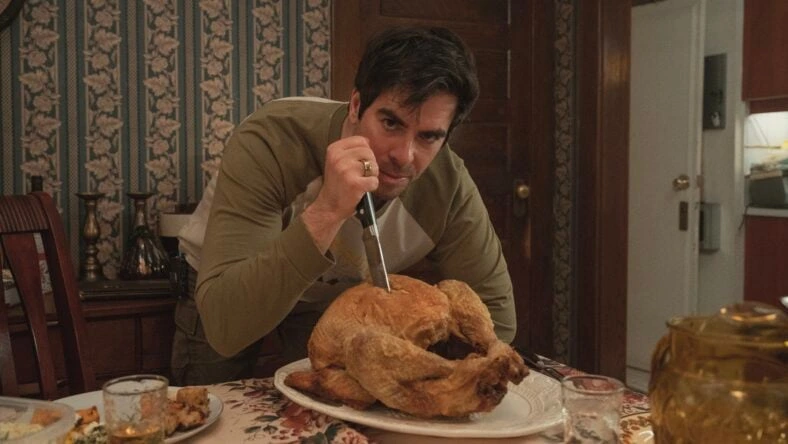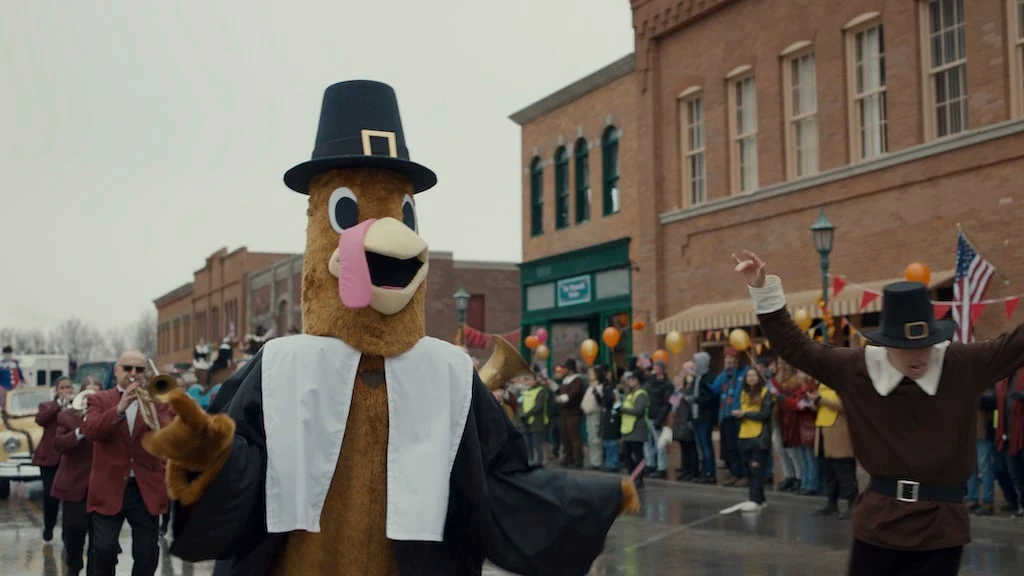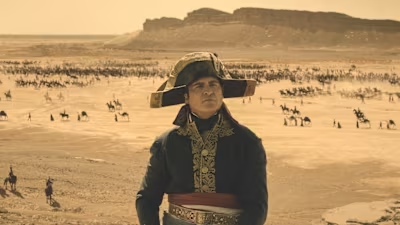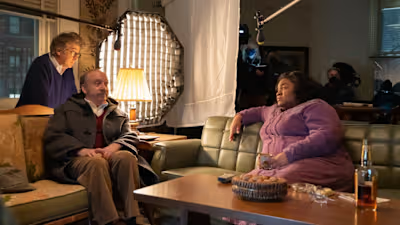Eli Roth Q&A on Thanksgiving, ‘the Only Critic That Matters,’ a…
Like this project
Posted Nov 16, 2023
Thanksgiving director Eli Roth is known for merciless horror, but he has his limits. He'll peel the skin off a diner employee’s face — as happens in the new
Likes
0
Views
60

Director Eli Roth on the set of TriStar Pictures and Spyglass Media Group, LLC THANKSGIVING
Thanksgiving director Eli Roth is known for merciless horror, but he has his limits. He’ll peel the skin off a diner employee’s face — as happens in the new holiday horror film — before letting an animal be harmed in one of his movies.
“In horror films, if someone has a pet dog, cat or bird, and they’re killed, I can’t enjoy the movie,” he says, explaining the lack of harm that comes to a cute cat in Thanksgiving. “Even though I know it’s fake, even though I know it’s a story, it bothers me. So I wanted to solve that once and for all. Someone needs to feed the pet.”
With Thanksgiving, Roth — the mastermind behind Hostel, Cabin Fever and The House With a Clock In Its Walls — enters the ranks of horror maestros like John Carpenter and Wes Craven. His Thanksgiving approach is no guts, no glory — and no leftovers. The film satirizes Black Friday consumerism with a shopping riot that ends in tragedy, and births a Thanksgiving-inspired killer who terrorizes Plymouth, Massachusetts.
Roth and co-writer Jeff Rendell grew up in Massachusetts, where the holiday is “shoved down your throats,” Roth says.
The writer-director and occasional actor embraces challenging projects and strong opinions, and never lets fear of blowback keep him from a project. His acting includes playing the Nazi-smashing “Bear Jew” in Quentin Tarantino’s Inglourious Basterds, and playing a music exec in HBO’s much-criticized The Idol.
His directing work is even more daring. The Green Inferno, which turns 10 this year, satirized phony allies with a story about college students who set out to help an Amazonian tribe — in search of social clout. Instead, the tribe eats them alive. The director followed up by mocking “slacktivists” in a 2016 Guardian article.
When Hamas attacked Israel on October 7, Roth made it clear he sides with Israel. Two days after the bombardment, he shared an Instagram post calling for support, using an image of his Basterds character. He also signed an open letter calling out the Writer’s Guild of America for failing to condemn the attack.
When I asked a question about the attack — tying in The Green Inferno — a publicist who was on the call cut it off. So the Thanksgiving PR team has some limits, too.
But before we got there, we covered everything from Thanksgiving star Patrick Dempsey being named People‘s sexiest man alive to prosthetic heads to dealing with critics. He doesn’t have to worry with Thanksgiving — it’s getting raves.
Joshua Encinias: How does it feel having 2023’s sexiest man alive in Thanksgiving?
Eli Roth: Well, you know, I worked with Rick Hoffman before. He was in a Hostel and I love him on Suits. I’m used to having that level of sexiness being around Rick Hoffman on set.
Joshua Encinias: I’m sure I’m the first person to ask you that.
Eli Roth: I was giving Patrick shit about it all day yesterday. He has a great sense of humor. It was actually pretty hilarious. None of us knew. And then we saw the news at about nine-thirty at night when our chat group just exploded with pictures and memes. Now, whenever I direct Patrick and there’s a chair that he sits in, we can say that’s the sexiest chair. That’s the sexiest fork.
Joshua Encinias: Your prosthetics team, Adrien and Kathy Morot, made a very impressive head for one of the Thanksgiving cast.
Eli Roth: It’s unreal. Their props look so real. Adrien and Kathy are so brilliant that when you’re in broad daylight, looking at the head and the eyes — and you’re standing with the actor it’s based on — you actually can’t tell the difference. It’s really spectacular. Adrien’s an artist. I’ve never seen heads that looked that realistic. It was magnificent.
We had a great time working together, as always. You know how much I love practical effects. It’s just a completely different feeling then when you see digital gore. I want to see it all for real splatting on the characters. When Adrien, Kathy and I sit down, we want to outdo ourselves. We want to outdo everything we’ve done before. I think Adrien should get the Oscar for Thanksgiving.
Joshua Encinias: When the actor’s prosthetic head is on the plate, I thought you put them through the table, because it looks so real.
Eli Roth: It looked that real in person up close. You put it next to [the] head and it looks identical. And when you have an artist like Adrien who’s that good, you can light it and put the camera that close to it and shoot it in sharp detail and it looks perfect. I don’t know how he does it. He’s a true master.
Joshua Encinias: Tim Dillon, who is in the cast. has a running bit on his podcast about his friend’s cat Oscar being a sociopath. I’m curious if his character’s cat in Thanksgiving is Oscar?
Eli Roth: No, that’s not Oscar. [Laughs.] The cat’s name is Dewey, which is a Boston reference. But I love animals, and anytime I see an animal in a movie, I just wanna make sure that nothing bad happens to it. In horror films, if someone has a pet dog, cat or bird, and they’re killed, I can’t enjoy the movie. Even though I know it’s fake, even though I know it’s a story, it bothers me. So I wanted to solve that once and for all. Someone needs to feed the pet.

A scene from Thanksgiving, directed by Eli Roth, from TriStar Pictures and Spyglass Media Group
Joshua Encinias: Do you have a movie in you that your audience wouldn’t expect? Something like John Carpenter’s Starman.
Eli Roth: Well, Borderlands, Death Wish, and Fin are very different types of movies. The House with a Clock in Its Walls is a PG movie. That is a movie for kids. So you’re trying to be scary in the confines of a PG world and make it feel like an Amblin film like the ones we grew up with. That’s always what’s fun and exciting and a challenge for me. Actually, I think that Thanksgiving is much closer to a throwback to my early films, but doing it with 20 years of experience under my belt.
Joshua Encinias: That said, people were first introduced to Thanksgiving as a trailer you created seventeen years ago for Quentin Tarantino and Robert Rodriguez’s Grindhouse.
Eli Roth: It was even longer ago than that. I was actually 12 years old when Jeff Rendell and I came up with the idea and the concept. We grew up in Massachusetts, and as you can imagine, there Thanksgiving is a huge deal. It’s like shoved down your throats, it’s the biggest holiday. You do a school play about it. There’s two separate pilgrim recreation villages you go to as a kid. There’s the parade. So for us, it was just the most obvious holiday to hang a slasher movie on, and that was when we were 12 and 13 years old.
Joshua Encinias: How did this trailer become a feature film?
Eli Roth: When Quentin (Tarantino) and Robert (Rodriguez) asked if I wanted to make a fake trailer, I had it ready. I got all the kills. We already knew there was a parade scene with a person in a turkey costume getting decapitated, running around like a turkey with her head cut off, and a human turkey being roasted. But we didn’t have any story.
After we made the trailer, we were so satisfied we thought, “Now we don’t even have to make the movie. We did the trailer. It’s perfect. Why do anything else?” And then for years, the fans kept posting it going, “When are they gonna make this?” And we started asking ourselves, “What is the story if we’re really going to make this?” We didn’t know.
Joshua Encinias: How did you crack the story?
Eli Roth: It was once we saw the Black Friday videos that started appearing online every year. People go to dinner say, “Oh, I’m so thankful. I just need my family, my health.” And then they’re trampling each other to death for flat screen TVs and PlayStations. There’s something really interesting here.
This is Christmas commercialism bleeding over into this holiday about being thankful. This is fertile ground. We can start the movie here, we can have our inciting incident here, but it can really give us a reason to make the movie.
Eli Roth on ‘the Only Critic That Matters’
Joshua Encinias: I think people have a hard time thinking of horror films as drama, or as humanistic. That’s usually a label given to award season movies. Yet there’s plenty of horror movies about capitalism, religion, consumerism, exorcisms, etc. Those are humanistic topics, even if the plots are different. Does that ever frustrate you?
Eli Roth: No, I’ll tell you why. Part of your job when you’re making a horror film is to be a little bit transgressive. It’s a little bit punk rock. You’re kind of putting a middle finger up, and you’re doing stuff that you’re not supposed to do. There’s a little bit of mischief involved in a horror film.
People are going to see things that you’re not supposed to do to other people, so you’re not doing it for respect. If you’re making a horror movie for respect you’re missing the point.
Joshua Encinias: What does a horror movie do that dramas do not?
Eli Roth: The point is to scare the audience. That is not a respectful act. You’re not moving people to tears. You’re making statements about humanity, but you’re dealing with some of the darkest aspects of humanity. The things that people are ashamed of. Ashamed to admit they enjoy seeing it happen to other people. So it’s great.
I’m happy for horror films when they win awards, but these aren’t award season movies. These are popcorn movies.
Joshua Encinias: Do you care if your horror movies received bad reviews?
Eli Roth: The truth is time is the only critic that matters. I’ve been doing this for twenty years now, and most of the people I’ve been talking to on this press junket were six years old when Grindhouse came out, and they tell you that that Grindhouse and Hostel are the most influential horror films of the aughts. That’s it. Those two movies.
That’s what changed them and made them want to be a writer or a creator. They’re not thinking about the reviews. They don’t know the term torture porn. They’re not thinking about box office failure with Grindhouse, it doesn’t matter to them. They’re just judging it by how they feel when they watch it and what their reaction was the first time they saw it. So to me, all that matters is how do people feel the very first time they watch Thanksgiving.
People come up to me and they say, “I was there opening weekend of Hostel. Thank you for that. That was one of the greatest experiences of my life.” That’s what I’m there for.
I’m there for people 15, 20 years from now who will go, “You know what? I saw Thanksgiving opening weekend and it was the best time I’ve ever had. I always get so bored because it’s all family movies and Christmas movies on Thanksgiving and you finally gave us a horror movie. I took my whole family and my grandmother threw up. It was the funniest night of our lives.”
Someone will have stories like that. That’s what I want. That’s the respect I’m interested in.
Joshua Encinias: Does it matter to you how people see your movies?
Eli Roth: The circumstances matter. A horror movie is like a perfume bottle. The first time you smell it is going to be the strongest, but every time you rewatch it, it’s going to lose a little bit of its potency. It will never be as scary or powerful as that very first screening. It really matters that you see it opening weekend with a big crowd because you will never have that experience again in your lifetime.
This could be the beginning of a franchise. This could be a new thing and you’ll remember it like you saw a rock concert. It’s not the same watching it on TV. You were there. You were part of it.
Joshua Encinias: Have you seen the movie Bacurau starring Udo Kier? It’s like an art house version of your movie The Green Inferno. Instead students trying to help a tribe like in your movie, the Indigenous people in Bacurau are being hunted for sport, and at the end they get the best revenge.
Eli Roth: I haven’t seen it yet, no.
Joshua Encinias: I also thought of The Green Inferno because you talked with The Guardian about the “slacktivist” college students you made it about. I think slacktivism became today’s cancel culture, and since Hamas’ attack in Israel on October 7, some students have lost opportunities because of things they’re saying in light of what happened. I’m curious if you think these real world consequences have popped the cancel culture bubble?
[The publicist interjects]: We’re going to skip that question.
Joshua Encinias: Okay.
[There’s quiet talking in the background. Roth doesn’t say anything.]
Joshua Encinias: Are we good?
Eli Roth: Yeah, hang on, I’m getting a hand gesture.
[Publicist]: Joshua? I think we’ve run out of time. So I’m gonna have to stop the interview right now. But we just want to thank you so much for coming to the interview.
Joshua Encinias: Okay.
[Publicist]: Did you have one last thing? Or Eli, do you want to add anything to the interview?
Eli Roth: No, whatever he wants to ask.
[Publicist]: Okay, I think we’re good then. Thanks, Joshua. Thank you so much. We really appreciate you coming.
Thanksgiving is now in theaters, from Sony Pictures Releasing.
Main image: Director Eli Roth on the set of Thanksgiving, from TriStar Pictures and Spyglass Media Group.
Share:





